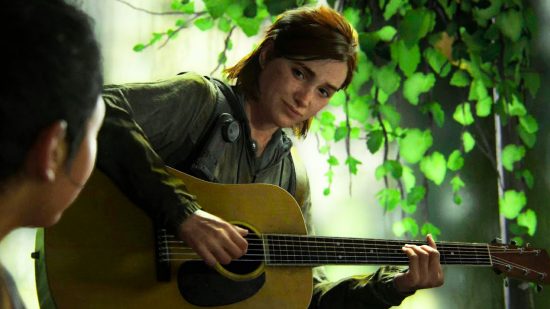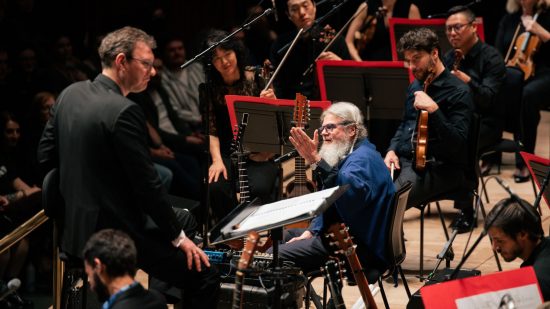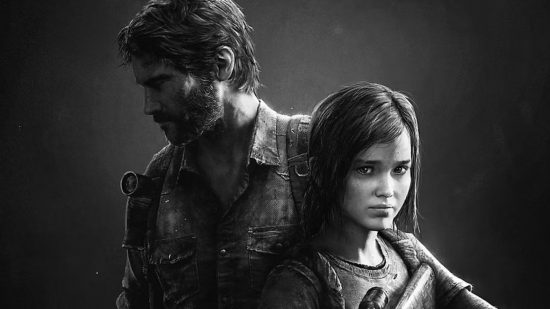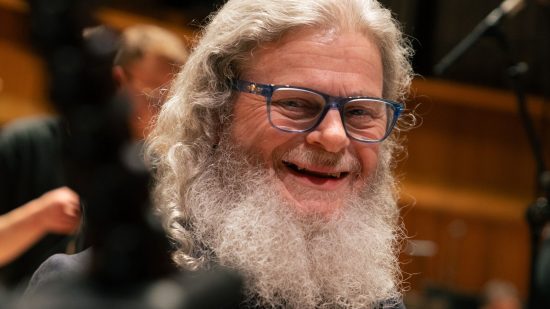The Last of Us co-creator Neil Druckmann has referred to the games’ music as part of their DNA, but it’s not until you’re surrounded by fans of the universe and immersed in a live orchestral rendition of the soundtrack that the gravity of that statement holds its true weight. Gustavo Santaolalla, The Last of Us’ award-winning composer, has gingerly stepped into the center of the stage at London’s Royal Festival Hall and, composed and unassuming, juggled a multitude of instruments as he flawlessly storms through the familiar, raw accompaniment to one of the greatest game series ever created.
This isn’t your typical symphony. Gone are the moments of pin-drop silence, replaced by whoops, cheers, and a mid-concert standing ovation that refuses to be quelled. Gustavo has had a huge impact and influence on today’s state of affairs and the elements that elevate the experience, including introducing the instruments he has mastered and drawing from his own repertoire. Speaking to PCGamesN before The Sounds of the Fireflies headed to London’s Game Music Festival, he tells of how he was originally just invited to listen to the concert, joining the orchestra for only two tracks – All Gone, and The Last of Us’ titular theme.

“This is a full concert, and it evolved in a particular way,” he explains. “When I saw the love and dedication that these people were putting into getting this together, even with everything I was doing such as finishing two feature films and two albums I said, ‘I want to get more involved’ and I did want to play more.” After having played some songs from The Last of Us at events such as The Game Awards with the LA Philharmonic orchestra, Gustavo already knew he loved to perform these heartfelt renditions of the iconic soundtrack in a live format, but tells me that having the freedom to put his stamp on the evening has turned it into “one of those [nights] that you will treasure forever.”
Gustavo’s trademark is felt throughout the performance and resounds in everyone present long after the final note rings out. In order to “move the energy” of the night, Gustavo also added some of his original songs to the setlist. “One of the things that I like to do the most is singing,” he says. Indeed, during the performance he humbly comments, “This one is for Bill and Frank,” before presenting a beautifully moving version of A Love That Will Never Grow Old, originally written for Brokeback Mountain, which won him an Oscar for Best Original Score. “We fell in love with that song, and it’s a song that fits perfectly with the Bill and Frank story,” he tells me, “It’s just perfect.”

The experimental experience saw Gustavo collaborate with the London Philharmonia Orchestra to induct new instruments into the performance. Joined by Juan Luqui, who Gustavo describes as his “right hand,” he switches effortlessly between the banjo, ronroco, octave guitar, electric guitar, and some PVC pipes that wouldn’t look out of place on a building site, but that he uses to create a sonic wall of resounding wails reminiscent of war cries. “Those instruments are part of my vocabulary,” he tells me. “The good thing with The Last of Us was that I could push that further than perhaps I could do with other projects because of the habitat in which it took place.”
Gustavo’s impressive vocals come out to play once more as the concert progresses. “There’s another song, it’s a rocker,” he laughs as he explains the decision to me before the show. “It’s a Spanish song called Ando Rodando, which is just perfect for Joel.” As I sit, mouth agape no matter how hard I try to contain my excitement, Gustavo belts through the number like second nature. The standing ovation that follows causes a look of emotional overwhelm to pass over his face, and the feeling is intoxicating. “It worked incredibly,” he tells me. “It was very emotional. It was something totally unexpected, to get a standing ovation in the middle of the show. It was really something.”

Gustavo has approached tonight’s event feeling humbled. “During the rehearsals I said [to the orchestra], ‘I’m totally aware that you guys play much more complex music than this so I really appreciate that you guys are playing this,’ and they were amazing. They came after the show, almost every one of them. It’s a big orchestra. They came one by one to say what an emotional journey this was.”
That emotional journey is down to Gustavo himself, and how he approached writing The Last of Us’ soundtrack. He had never considered videogame music composing before. “I’m a terrible gamer,” he laughs, “I always preferred to be playing an instrument or playing music than playing a game, so I never developed the skills to do that. By the time we started working on The Last of Us, my son was in his mid-teen years and he was amazing, so I enjoyed watching him play like I enjoyed watching my buddies playing FIFA. It’s like watching a football match! Watching my son play, I always thought in the back of my mind, if one day someone connects on an emotional level with gamers it’s going to be revolutionary. It will really change things.”

After the success of his soundtracks for Babel and Brokeback Mountain, Gustavo tells me that he was approached by “several” companies to create videogame music. He won’t name names but promises me that they were big projects “in every sense,” but that it just wasn’t what he wanted to do. “Whatever success I have achieved has to do not only with the stuff that I’ve done but also the stuff that I’ve said no to,” he explains. “And I was daft to say no, because they were really good projects, but it was more of the same.” When Neil Druckmann approached Gustavo to compose the game’s score, he was explicit in the fact that he wanted and was seeking out a connection with those who would play the game. As soon as those magical words were uttered, Gustavo said, “I’m in,” and the work began.
“It was very organic,” Gustavo tells me, “I had total freedom.” He was shown a few drawings of the landscapes – these huge, imposing buildings that had been abandoned, leaving way for nature to creep in and take over – as well as a few early sketches of Ellie, but the real information came from a 90-minute storytelling exercise in a conference room, where Neil Druckmann would tell Gustavo all about Joel, Ellie, and their journey. “I remember writing the main theme,” he explains, “I went and picked up the ronroco and the big section just came to me.”
Over the next two-and-a-half years, Gustavo would regularly meet with Druckmann to play him new music, which almost always found a home within The Last of Us. That inspiration wasn’t a one-way journey though, he tells me. “There were pieces of music that inspired him to write other parts of the story. I would give him the music and that would trigger him to say, ‘After this piece you gave me, I wrote this.’”
This long and collaborative process connected gamers with the music more successfully than any of the team could have anticipated, as Gustavo explains, “I will say that the confirming factor was when we learned that people were crying while playing the game because they were so touched by it.” He also tells me of the fans who say his music has affected them positively as they struggled through illness, loss, and other challenging life events.
After beginning his music writing career at just 17, Gustavo went on to become part of a popular Argentinian band in his 20s, Arco Iris, before becoming a producer and forging on to create soundtracks for films. “I got all of this recognition from the movies,” he smiles. “But The Last of Us fans are a different breed. It’s a devotion that they have for the music. It’s unbelievable. It’s very rewarding to see that, with the music, you can affect people in such a nice way.”
Being in the room with those fans, I can feel that devotion rippling through the atmosphere. Gustavo has his own theories on why this electricity is so physically resonant. “We know through quantum physics that the object is modified by the observer,” he tells me. “Sometimes you can be working on a track for a week in the studio and you have everything perfect – the guitar, the bass. Suddenly, a week later a friend comes in and you say, ‘I want to play something for you,’ and the friend sits down, you press play. You’re listening with your friend and you go, ‘Oh, that guitar could be different over there,’ ‘Oh, yeah, the drum is missing.’ You start hearing other things because someone else is listening and so that modifies it. All those elements of modifying things, when you’re playing live they’re all present, so in a way everybody is a part of what you’re playing.” We both agree to describe that connection as nothing less than “magic.”
With so many factors going into the success of The Last of Us, as a game, as an HBO TV series, and as a soundtrack, it could be difficult to pin it on any one reason. Gustavo’s ability to lean on right notes disguised as wrong notes, to experiment with mistakes that are actually huge assets, and to make a jarring and real accompaniment to the story are all vital strands of the DNA that weaves through the universe. “In general if you’re recording the guitar you make sure that you don’t get any of the noises when you move your hands along the frets. Sometimes I will push the volume of those instead. I make those noises part of the aesthetic,” he explains. “It makes it much more human, because life is like that. It’s full of rough edges and imperfections.”
Whether the music of The Last of Us can be expanded remains to be seen, but Gustavo doesn’t want it off the table just yet. “Just in the way that Craig [Mazin, co-creator of the HBO show] found in the series to expand on the story of Bill, I feel the same way with the music. There is a lot of territory that we can go deeper into, and I hope that we will be able to do so,” he tells me. “It depends on where the universe of The Last of Us will take us.”



